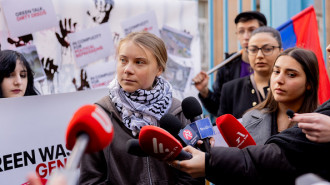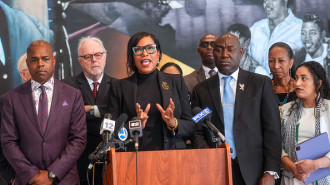Britain gives Libya £9 million to fight threats of terrorism
The aid is an attempt to stabilise Libya in order to stem the threat of terrorism arriving on Britain’s shores, Johnson said during his visit to the North African state.
“Libya is the front line for many challenges which left unchecked can pose problems for us in the UK – particularly illegal migration and the threat from terrorism,” Boris Johnson said during a visit to the North African state.
“That's why it is so important that we work with the Libyan government and our partners to help bring stability to Libya, stopping it from becoming a fertile ground for terrorists, gun-runners and people traffickers in close proximity to Europe,” he said, after meeting Libya's Prime Minister Fayez al-Serraj.
Tripoli is expected to collect some £4 million to support the removal of mines and improvised explosive devices (IEDs) and £2.75 million to support women’s participation in peace-making and rebuilding in Libya, ITV reported.
Another £1.29 million will be allocated to providing food, essential hygiene items and urgent health care needs for displaced people, while £1 million will be used to rebuild the country’s damaged infrastructure and restore basic public services.
Since a 2011 revolution that ousted long-time dictator Muammar Gaddafi, Libya has been plagued by security problems and political actors have had to depend on rival militias battling for control of the country. The political vacuum has allowed extremists, arms dealers and people traffickers to gained a foothold in the country.
On Wednesday, at least 11 people were beheaded after an attack on a checkpoint controlled by Libyan military strongman Khalifa Haftar south of Tripoli, a spokesman for his forces said.
"At least nine soldiers were beheaded... in addition to two civilians" at the checkpoint about 500 kilometres (300 miles) south of Tripoli, Colonel Ahmad al-Mesmari said, blaming the Islamic State group for the gruesome attack.
The IS militant group is on the rise in Libya, having recently suffered a series of defeats in the country's 'Oil Crescent'.
But Libya is also a key route for thousands of illegal immigrants attempting to enter Europe, where Islamic State attacks have seen a sharp increase.
Libya's national unity government (GNA) has warned Europe faces a growing risk from terrorists unless it does more to help the country stem the massive tide of illegal migrants.







 Follow the Middle East's top stories in English at The New Arab on Google News
Follow the Middle East's top stories in English at The New Arab on Google News
![Beirut suburb struck [Getty]](/sites/default/files/styles/image_330x185/public/2184360972.jpeg?h=a5f2f23a&itok=P9x4a9qu)

